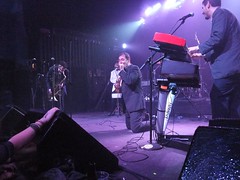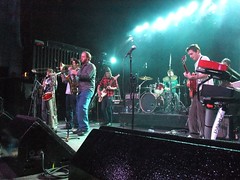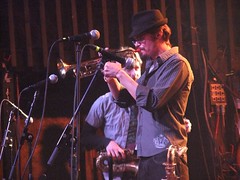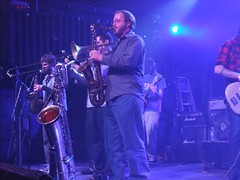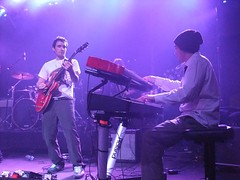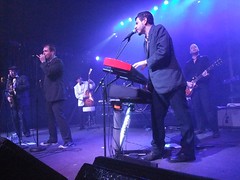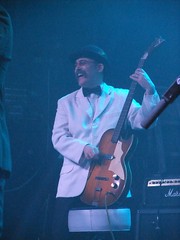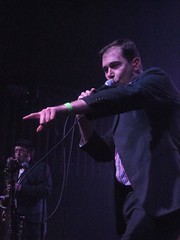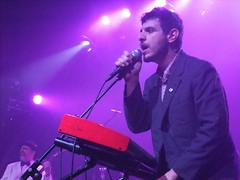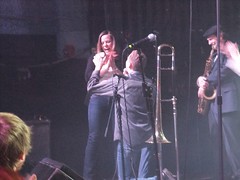22 January 2011 (Soiled Dove Underground, Denver CO)
Jonathan Coulton and his perpetual openers, Paul and Storm, have stumbled onto a perfect chemistry. Paul and Storm create the wise cracking, comedy shtick that loosens the crowd. Then Coulton comes out and adds depth with his technical playing ability and thoughtful lyrics. The balance is perfect.
The Soiled Dove seems to be Coulton's favorite venue in Colorado. It's an intimate venue, with reserved seating and an old style cabaret feel. This room is another factor in what makes Jonathan Coulton's show work so well.
Paul and Storm
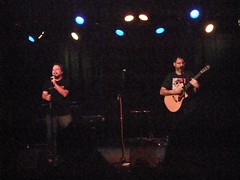 Paul and Storm
Paul and Storm are regular contributors to
the Bob and Tom Show and a host of other internet and radio outlets. Comedy is a tough business. Once someone has heard the joke, it's harder to get a good laugh out of them again. Musical comedy seems even tougher: it's either stretching out a single joke or creating a related series of jokes. Paul and Storm have thrived in this world for a some time, as part of a capella wonders, Da Vinci's Notebook
, and now as a duo.
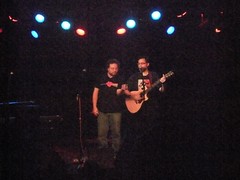
Last time JoCo was here, Paul and Storm opened and were hysterical. Even with many of the same songs and jokes, they killed again. Part of this was that much of the crowd was already primed to participate. So, during their usual opening song,
Opening Band, the crowd was prepared to throw panties (and one pack of 'tan peas') on cue (
see 1:46).

They breezed through favorites, like the Gregorian chanted
Nun Fight and a set of one sentence songs. They also pulled out a couple of newer pieces, including
I Will Sing a Lullabye and
Frogger! The Frogger Musical. Throughout their set, they kept a loose, improv feel, riffing off the audience and pushing what turned out to be their new catchphrase, "_____ is the name of my ___________cover band". So, in response to the
Opening Band panties, one commented that "this is like Panty Christmas for us", prompting the response, "Panty Christmas is the name of my Spice Girls cover band."
They closed with the perennial favorite,
The Captain's Wife's Lament. That it's just an extended setup for a juvenile punchline didn't matter. The crowd's pirate participation took it over the top.
Jonathan Coulton
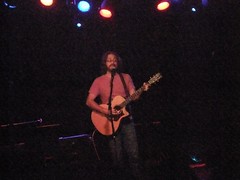 Jonathan Coulton
Jonathan Coulton's first job when he came out was to battle the remaining pirates in the audience to take control of the show. Within a couple of songs, (
Millionaire Girlfriend,
Shop-Vac, and
IKEA), he had us on board. Part of the difference from Paul and Storm is that Coulton creates a more personal connection with the audience. His humor is more sardonic, but he can also mix in deeper themes with the laughs.
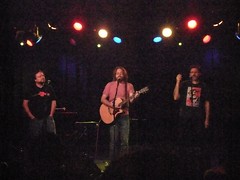
His flow of songs smoothly moved the audience through a set of moods. His version of
Code Monkey was more wistful, emphasizing the pathos at its heart. This led into
Big Bad World, continuing the focus on socially inept characters. Just as that mood started to inch towards being too heavy, he riffed on the idea of celebrities suffering from the horrible crushing burden of fame to set up
Tom Cruise Crazy.
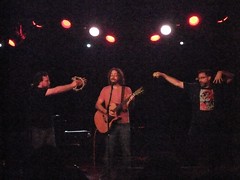
Aside from all the favorites, JoCo pulled out some songs from was an upcoming album (produced by They Might Be Giant's John Flansburgh). Coulton was apologetic about sharing new songs instead of playing more of the older material, but the crowd was eager to hear the new tunes. They ranged from the passive aggressive
Alone at Home to the poignant
Now I am an Arsonist.
Down Today featured Coulton playing the ukulele, but getting a blues guitar feel.
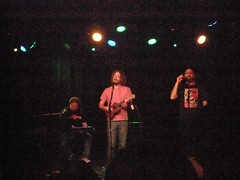
Another treat was
Soft Rocked By Me, from his old
Thing a Week set. The subtle humor was nice, but the treat was the medley of songs referenced by Paul and Storm, from Gordon Lightfoot to Alanis Morissette. We all learned that Bob Seger is the eye at the center of the soft rock storm: everything kept coming back to
Like a Rock. The sing along ending was priceless, ending on
Hey Jude: "Na-na-na na-na-na-na, na-na-na-na like a rock!"
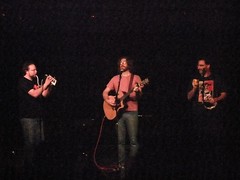
This was my second time catching Jonathan Coulton live and this show had a different vibe from the last one. Not better or worse, just a different flavor from the range that he can offer. Sip a homebrewed beer and revel in the taste you got this time.
More photos on my
Flickr.
 Last month I reviewed Asobi Seksu's single, Trails. I loved Yuki Chikudate's ethereal voice and the experimental post punk groove. This got me excited to hear their upcoming album, Fluorescence, due out February 15 (Polyvinyl Records). The new album delivers on the promise. Asobi Seksu shimmery sound is rooted in a dreamy mix of indie guitars, synthesizer swirl, and post punk pop. It's a tightrope balance of retro and modern elements.
Last month I reviewed Asobi Seksu's single, Trails. I loved Yuki Chikudate's ethereal voice and the experimental post punk groove. This got me excited to hear their upcoming album, Fluorescence, due out February 15 (Polyvinyl Records). The new album delivers on the promise. Asobi Seksu shimmery sound is rooted in a dreamy mix of indie guitars, synthesizer swirl, and post punk pop. It's a tightrope balance of retro and modern elements.


















